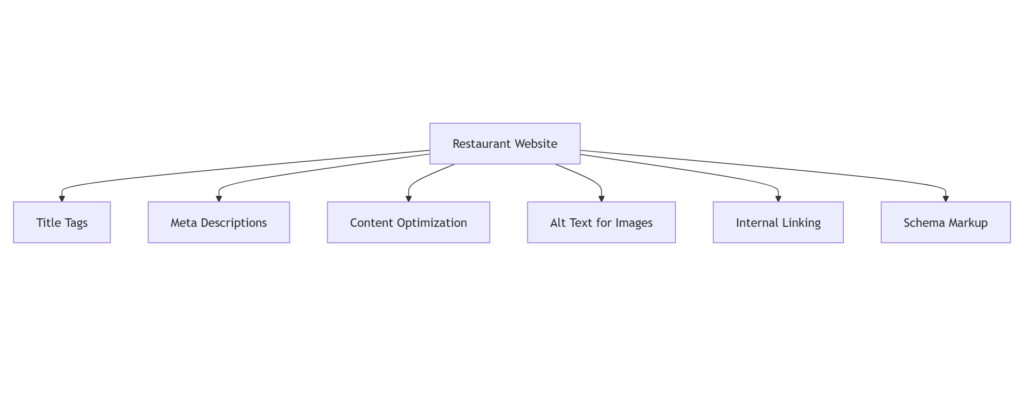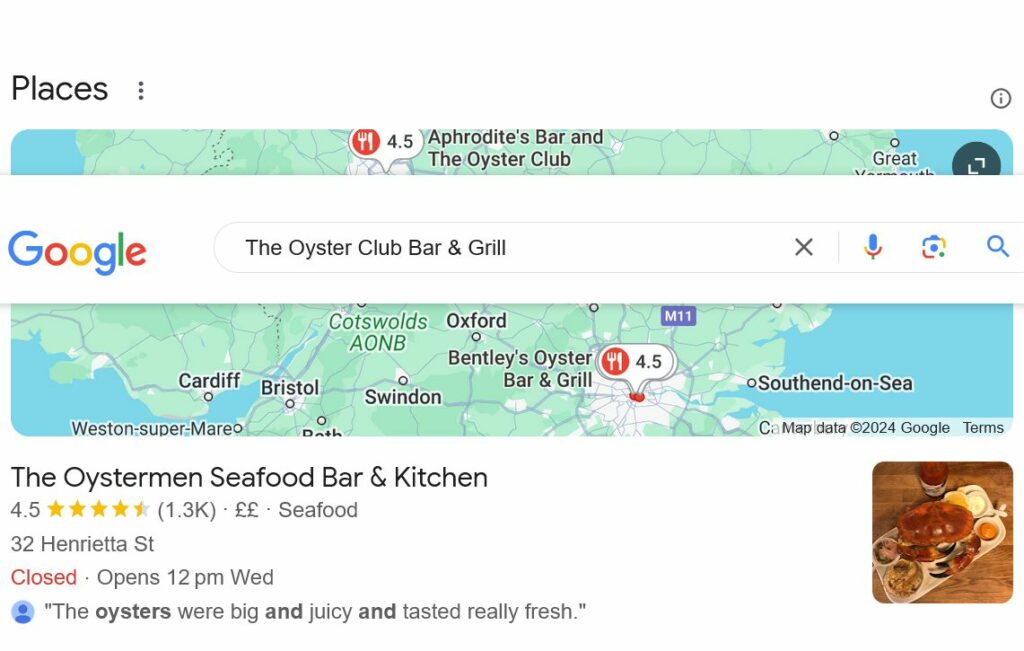SEO for Restaurants
In the current competitive landscape of the restaurant industry, having a solid online presence has shifted from being a choice to a necessity. SEO for Restaurants plays a crucial role in ensuring that your restaurant stands out to potential customers searching online. Let’s explore the most effective SEO strategies for restaurants, ensuring you drive more traffic to your website, attract new customers, and increase bookings.

Why SEO is Essential for Restaurants
Many customers depend on search engines like Google for information when exploring new dining establishments. Implementing search engine optimisation (SEO) for your restaurant can help increase your search results, leading to greater visibility and increased foot traffic. By implementing the correct SEO strategies, restaurants can attract more local customers, increase reservations, and enhance brand recognition.
Keyword Research for Restaurants
Keyword research is the fundamental building block of a successful SEO strategy. Identifying the right keywords helps ensure your restaurant appears in relevant search results. Here’s how to find the best keywords for your restaurant:
- Target Location-Based Keywords
Focus on keywords that include your restaurant’s location. For example, “best Italian restaurant in Chicago” is more likely to convert than a generic search like “Italian restaurant.”
- Identify Long-Tail Keywords
Long-tail keywords are precise phrases, such as “family-friendly pizza place near me.” These keywords with lower search volume often appeal to potential customers with strong intent to purchase, making them more likely to convert.
- Research Competitor Keywords
Analyse competitors’ websites to discover which keywords they are ranking for. Tools like SEMrush and Ahrefs offer valuable insights into user behaviour and preferences, ultimately leading to more successful strategies.
- Focus on Search Intent
Ensure your keywords align with search intent, whether users are looking for information (e.g., “types of sushi”) or intent-based actions (e.g., “book a table at sushi restaurant”).

On-Page SEO Best Practices
On-page SEO involves optimising individual pages on your restaurant’s website to rank higher and attract relevant traffic. Here are some critical elements to focus on:
- Title Tags and Meta Descriptions
Each page should have a unique, keyword-optimised title tag (between 50-60 characters) and a compelling meta description (150-160 characters) that encourages clicks.
- Optimise Content for Keywords
Ensure your content is written with the user and search engines in mind. Use your target keywords naturally in headings (H1, H2) and throughout the text, but avoid keyword stuffing.
- Use Alt Text for Images
Optimise all images with descriptive, keyword-rich alt text. For example, to improve SEO, instead of using “image1.jpg,” opt for “fresh-homemade-pasta.jpg.”
- Internal Linking
Link-related pages on your website will assist users in navigating to other authoritative pages. For instance, link your blog posts to your menu page or reservation system.
- Schema Markup
Add structured data using schema markup to enhance how your restaurant’s information, such as opening hours, reviews, and pricing, appears in search results. This improves the likelihood of rich snippets, making your listing more attractive.
Local SEO Optimisation for Restaurants
Local SEO ensures that your restaurant ranks in searches conducted by nearby users. Since restaurants primarily rely on local traffic, this is one of the most critical aspects of your SEO strategy.
- Claim and Optimise Google My Business
Your Google My Business (GMB) listing is crucial for local SEO. Ensure that your GMB profile is complete with accurate information about your location, hours of operation, and contact details.
- Ensure NAP Consistency
NAP (Name, Address, Phone number) consistency is vital for local SEO. Ensure your restaurant’s information is consistent across all platforms, including your website, GMB, and directory listings.
- Local Citations
List your restaurant on local directories like Yelp, TripAdvisor, and Foursquare. These citations help build authority and drive local traffic.
- Encourage Online Reviews
Encouraging satisfied diners to share positive feedback on websites like Google and Yelp can substantially influence a business’s local search rankings. It’s important to actively seek feedback from satisfied customers and respond promptly and appropriately to positive and negative reviews. This boosts the restaurant’s internet reputation and shows potential customers that their opinions are valuable.
- Create Location-Specific Pages
If you have multiple locations, create separate pages for each one. Optimise these pages with location-specific keywords and content that addresses the local audience’s needs.
Content Marketing For Restaurants To Skyrocket Your Business
The Importance of Google My Business
Google My Business (GMB) is one of the most powerful tools for increasing your restaurant’s visibility in local searches. Optimising your GMB profile can directly impact your local SEO performance:
Accurate Information: Ensure that your restaurant’s address, hours of operation, phone number, and website URL are correct and regularly updated.
Photos and Menu: Add high-quality images of your restaurant’s interior, food, and menu. Dine-in customers are more likely to visit local restaurants that have attractive images.
Respond to Reviews: Interact with customers by replying to their reviews. This demonstrates that you value consumer input and want to create trust.
Mobile Optimisation for Restaurants
A significant portion of restaurant searches occur on mobile devices, so mobile optimisation is crucial. Make sure that your website is adaptable and loads rapidly on every type of device.
- Responsive Design
Make sure your website is responsive so it looks great on all screen sizes and offers desktop and mobile visitors the best possible experience.
- Fast Loading Speed
Page speed is a ranking factor, especially on mobile devices. Compress images, leverage browser caching, and minify CSS and JavaScript files to ensure fast loading times.
- Easy-to-Use Navigation
Ensure that your mobile site is simple to use, with clear CTAs (e.g., “Order Now,” “Book a Table”) that are accessible without excessive scrolling.

Optimising for Voice Search
The usage of voice search is becoming more and more common, with many people increasingly relying on apps like Google Assistant, Siri, and Alexa to locate nearby restaurants.
- Use Conversational Keywords
Voice searches tend to be more conversational. Optimise your content with natural, question-based keywords like, “Where can I find the best Italian food near me?”
- Local Optimisation
Since most voice searches are local, focus on optimising for “near me” searches and ensure your Google My Business information is accurate.
- Create FAQ Sections
A well-crafted FAQ section can address common queries users may ask via voice search, increasing your chances of appearing in voice search results.
Technical SEO for Restaurant Websites
To improve your website’s search engine rankings, it’s essential to focus on technical SEO. Technical SEO ensures that search engines can properly crawl and index your website’s content. It involves optimising elements such as website speed, mobile-friendliness, site structure, and meta tags to make your site more accessible and understandable for search engine crawlers.
- XML Sitemap
Creating an XML sitemap is vital in improving your website’s search engine optimisation (SEO) efforts. By creating an XML sitemap and submitting it to Google Search Console, search engines can efficiently scan and index your website’s pages. This can improve your website’s visibility and make it easier for users looking for relevant information to find.
- SSL Certificate
When developing a website, it’s important to have an SSL certificate. This certificate guarantees that the data passed between the web server and its users remains private and secure. In addition to offering visitors a secure browsing experience, having an SSL certificate is also considered a ranking factor in Google’s algorithm. This means that a secure website can gain visibility and ranking in search engine results.
- Fix Broken Links
It’s vital to regularly scan your website for broken links to Maintain a great user experience and SEO performance. Broken links, commonly known as 404 errors, can annoy visitors and lower your website’s search engine rankings. As a result, frequent audits are essential for identifying and swiftly repairing any broken links on your website.
- Structured Data
When implementing structured data using schema markup for a restaurant website, specific elements such as menu items, pricing, customer reviews, and reservation systems must be included. This enables search engines to better comprehend and show relevant business information, increasing the website’s exposure and user experience.
Content Marketing Strategies for Restaurants
Content marketing is essential for engaging new customers and improving your SEO efforts. High-quality content attracts users and encourages them to take action.
- Start a Blog
Blogging about food trends, events, and restaurant news can help drive traffic and build authority. Focus on writing content that includes high-ranking keywords.
- Recipes and Cooking Tips
Share your restaurant’s recipes or offer cooking tips. This type of content builds trust among your audience and promotes social sharing.
- Video Marketing
Videos are a powerful content type. Consider creating short videos featuring your chef preparing signature dishes, customer testimonials, or behind-the-scenes looks at your restaurant.
Building Quality Backlinks for Restaurant SEO
Backlinks play an essential influence on search engine results. Here’s how restaurants can acquire high-quality backlinks:
- Local Partnerships
Partner with local businesses and get listed on their websites. Cross-promotion can lead to valuable backlinks.
- Guest Blogging
Write guest posts for food blogs and local websites. In return, they will often provide a link back to your restaurant’s website.
- Online PR
If your restaurant is involved in events or fundraisers, contact local media outlets for coverage. Online articles and press releases often include links to your website.

Using Social Media for SEO
Social media doesn’t directly impact SEO rankings, but it does drive traffic to your site, increasing the likelihood of backlinks and higher search rankings.
- Consistent Posting
Post interesting content, promotions, and updates regularly
on platforms such as Twitter, Instagram, and Facebook.
- Engage with Followers
Respond to comments, direct messages, and reviews. Social engagement increases brand loyalty and can indirectly influence your SEO.
- Link to Your Website
To direct traffic back to your website, provide a link to it or specific pages in your social media accounts and posts.
Tracking and Measuring SEO Performance
To guarantee that your SEO efforts are successful, track and analyse results on a regular basis utilising platforms such as Google Analytics and Google Search Console.
- Monitor traffic
Check how much traffic is coming from organic search and track any fluctuations over time.
- Analyse Keyword Rankings
Track the rankings of your restaurant target keywords using keyword-tracking tools and make changes to your strategy as necessary.
- Track Conversions
Determine the amount of visitors who take desired actions, such as making appointments, placing orders, or subscribing to newsletters.
Advanced Link-Building Strategies for Restaurant SEO
High-quality backlinks are one of the most significant factors that help Google determine the authority of your restaurant website. Here are some advanced link-building strategies to take your restaurant’s SEO to the next level.
- Influencer Outreach and Collaborations
Partnering with local influencers, food bloggers, or Instagram food personalities can boost your social media presence and provide valuable backlinks to your website. Ensure the influencers you collaborate with share genuine, high-quality reviews or blog posts about your restaurant, linking back to your site.
- Sponsor Local Events
Consider sponsoring local community events, festivals, or charity fundraisers. Many event organisers create websites or landing pages for their events and will often link to sponsors’ websites. This gives you a backlink from a trusted, local source.
- Offer Exclusive Promotions to Other Websites
Collaborate with local online publications, lifestyle blogs, or foodie websites by offering exclusive deals or discounts to their audience. In return, these websites will often provide a backlink to your restaurant’s site.
- Leverage Testimonials
Write testimonials for suppliers, local food producers, or service providers you work with. Many businesses include client testimonials on their websites, and it’s an excellent opportunity to get a backlink from an industry-relevant website.
The Role of User-Generated Content in Restaurant SEO
User-generated content (UGC) can significantly enhance your restaurant’s SEO. Customers creating content, such as photos, videos, reviews, and social media posts, not only promote your business but also provide content that Google sees as authentic and engaging.
- Encourage Customers to Post Reviews
Positive reviews on platforms like Google, Yelp, and TripAdvisor build trust and improve your local SEO ranking. Encourage satisfied customers to leave reviews by offering small incentives, such as a discount on their next meal.
- Create Social Media Hashtags
Create a distinctive hashtag for your restaurant and encourage guests to use it while sharing their dining experiences. You can also run contests or campaigns that incentivise customers to share their photos or stories, expanding your online presence.
- Feature User Content on Your Website
Repost customer photos, reviews, or testimonials on your website’s blog or testimonial page. Curating UGC for your content helps create a sense of community and increases engagement, which can positively impact your SEO.
- Respond to Customer Feedback
Whether a review is favourable or unfavourable, reacting publicly to customer feedback demonstrates that you value their opinion. This interaction can also lead to better engagement metrics, which search engines may view favourably.

Utilising Paid Advertising to Support SEO Efforts
While SEO focuses on organic traffic, paid advertising through channels like Google Ads or social media platforms can complement your SEO strategy. Paid search ads can place your restaurant at the top of search results while you build your organic rankings.
- Google Ads
Target specific keywords with Google Ads in your geographical areas. For example, you can bid on high-intent keywords like “best steakhouse near me” to drive immediate traffic while your SEO strategy works in the background.
- Social Media Ads
Platforms like Facebook and Instagram allow highly targeted advertising. You can promote your restaurant to users based on location, interests, and online behaviour. These ads can bring new visitors to your website, increasing brand awareness and encouraging social sharing.
- Retargeting Campaigns
Use retargeting ads to reach people who have previously visited your website but have yet to complete an action, such as making a reservation or placing an order. Retargeting can help bring these users back, increasing conversions and site traffic over time.
The Impact of Online Directories and Aggregators on SEO
Listing your restaurant on online directories and food aggregators (like UberEats, GrubHub, or DoorDash) can significantly boost your online visibility. These services are used by plenty of people to find new restaurants, and being present on them can drive both direct orders and traffic to your website.
- Ensure Consistent NAP Information
As you post your restaurant on several platforms, be sure that all of your profiles have the same Name, Address, and Phone number (NAP). Inconsistent information can mislead search engines, resulting in a reduction in your local SEO rankings.
- Maximise Your Visibility on Food Aggregators
Food delivery apps often have their ranking algorithms. Enhance your restaurant’s visibility by maintaining high customer ratings, quick response times, and an updated menu. These factors contribute to higher placements within their search results.
- Take Advantage of Directory Listings
Local directories such as Yelp, TripAdvisor, and Google My Business are essential for any restaurant. Ensure your listing has a detailed description, photos, and positive customer reviews. Search engines frequently crawl listings on these sites and can help boost your SEO.
Monitoring Competitors and Staying Ahead
To remain competitive in your restaurant’s SEO strategy, it’s essential to monitor your competitors and adjust your approach based on their performance. Here’s how you can stay ahead:
- Analyse Competitor Keywords
Use tools like Ahrefs or SEMrush to research the keywords your competitors are ranking for. You can identify gaps or opportunities in your strategy by targeting keywords they may be overlooking or weak on.
- Track Their Content Strategy
Review your competitors’ content, including blog posts, videos, and social media updates. If they’re consistently ranking higher, assess what kind of content is driving their traffic and develop similar or improved content for your audience.
- Monitor Local SEO Tactics
Pay attention to how competitors are performing in local search. Are they receiving more reviews? Do they have more citations in local business directories? Use this data to fine-tune your local SEO efforts.
Related articles:
Best Marketing Strategy For Restaurants
Content Marketing For Restaurants
Marketing Strategies For Restaurants
Challenges Faced By Restaurants
Effective Restaurant Marketing
Conclusion
A well-executed SEO strategy is vital for restaurants to stand out in a competitive landscape. From conducting thorough keyword research to building quality backlinks and optimising for mobile and voice searches, every component of SEO plays a role in driving organic traffic and attracting more customers.
By investing in on-page optimisation, local SEO, technical SEO, content marketing, and social engagement, restaurants can enhance their visibility in search engines, improve their online reputation, and ultimately increase reservations and revenue.
As search algorithms evolve and customer behaviours shift, regularly auditing and updating your SEO strategy is essential to maintaining top rankings and staying ahead of the competition.
By following these comprehensive strategies, your restaurant can achieve tremendous success online, attracting more diners and ensuring long-term growth in an increasingly competitive market.
FAQ’s
Does SEO work for restaurants?
Yes, SEO works exceptionally well for restaurants, especially local SEO. Most customers use search engines to find places to eat, and it is an everyday occurrence. An effective SEO strategy can raise your website’s exposure in local search results, improve website traffic, and eventually increase restaurant sales.
SEO helps your restaurant: Appear in “near me” searches: These searches are often intent-driven, meaning users are ready to visit or place an order.
Rank higher on Google Maps: Optimising your Google My Business profile and focusing on local SEO boosts your restaurant’s chances of appearing in the top Google Maps listings.
Enhance brand visibility: Even if users don’t immediately choose your restaurant, a high rating over time builds familiarity and awareness, which may encourage return visits.
How much should I pay for local SEO?
The cost of local SEO can vary depending on your location, competition, and the scope of work needed. Generally, prices range between $300 to $2,000 per month for local SEO services. Here’s a breakdown of factors influencing the cost:
Competition: If you are located in a highly competitive city or market, the cost may be higher due to the need for more advanced strategies and content creation.
Scope of Work: Basic local SEO services, like optimising Google My Business and building citations, may cost less, while comprehensive services, including technical SEO, content marketing, and link building, require a larger budget.
Agency or Freelancer: Hiring a local SEO agency usually costs more than working with a freelancer, but agencies may offer broader expertise and tools.
It’s essential to find a provider who offers transparent pricing and a clear strategy for achieving results.
Is doing a local SEO worth it?
Yes, doing local SEO is absolutely worth it, especially for restaurants that rely on local customers. Here’s why:
Increases Visibility: Local SEO ensures your restaurant appears in searches made by potential customers nearby, which means more visibility to people ready to visit or order.
Attracts Targeted Traffic: Local SEO helps you reach people explicitly searching for restaurants in your area, making the traffic more relevant and likely to convert into actual customers.
Higher ROI: Since local SEO targets people intending to visit, it generally leads to a higher return on investment than broader marketing strategies.
Builds Long-Term Growth: While SEO takes time to show results, the long-term benefits of increased organic traffic, better rankings, and more reviews make it a valuable investment.
Local SEO is a cost-effective way for restaurants to increase foot traffic, online orders, and overall brand awareness.
The Secret Sauce: Insider Tips For Effective Restaurant Marketing


